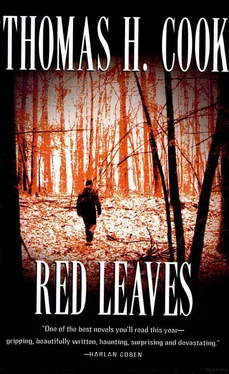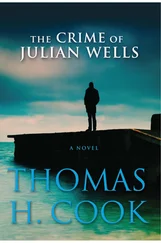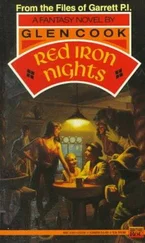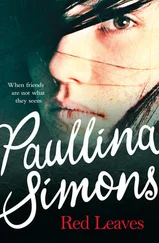"Yes, I was awake," I answered.
"So you saw Keith when he came home?"
"Yes."
"When did you see him?"
"I heard him come down the driveway," I said.
Mercifully the next question— Was he alone?- —never came, a blank I made no effort to fill in.
Leo smiled at me appreciatively. "Good," he said, as if I were a schoolboy who'd spelled the word correctly. He turned to Keith. "I'll keep track of the investigation for you." He leaned over and patted my son's knee. "Don't worry about a thing." He started to rise, then stopped and lowered himself back down on the sofa. "One other thing," he said, his eyes on Keith. "Were you ever over around the water tower?"
I saw a dark sparkle in my son's eyes.
"Water tower?" Keith asked.
"The town water tower, you know where it is, don't you?" Leo said. "About a mile outside town."
"I know where it is," Keith answered warily, as if it were a guilty knowledge.
"So, were you ever over that way?"
Keith shook his head. "No," he said.
With no further word, Leo got abruptly to his feet again. "Well, I'll keep you all informed as this thing goes forward," he said. He turned and walked to the door. "Well, have a nice day."
Meredith stepped forward quickly. "I'll walk you to your car, Leo," she said.
Seconds later I was alone in the living room, Keith upstairs, Meredith and Leo strolling down the walkway toward his impressive black Mercedes.
Briefly, I sat on the sofa, but anxiety soon overtook me, and I rose and walked to the front window. Meredith and Leo were standing beside his car, Leo nodding in that worldly way of his as he listened to Meredith. She seemed more animated than she'd been since Amy Giordano's disappearance, her hands fluttering about as if she were trying to catch an invisible butterfly. Then Leo said something, and her hands stopped their edgy flight, froze for a moment, and finally dropped to her sides like weights.
She listened as Leo spoke in what appeared to be slow, deliberate terms, her gaze fixed on him with great intensity until she abruptly glanced toward the house, the window where I stood, and in response to which, I stepped quickly out of view, like a peeper unexpectedly caught in the act.
I'd returned to the sofa by the time she came back into the house.
"Well, how do you think it went?" I asked.
She sat down beside me, calmer now, and less angry than before. "We'll get through this, won't we, Eric?" she asked.
"What?"
"No matter what happens, we'll get through it."
"Why wouldn't we?"
She appeared at a loss for an answer but said finally, "Because of the strain, the pressure. Sometimes families break."
"Or come together," I said. "Like those covered wagons when the Indians attack."
Her smile was ghostly faint. "Like covered wagons, yes," was all she said.
I went back to the shop a few minutes later, hoping that Leo Brock was right, that there was nothing to worry about.
"Everything okay?" Neil asked.
"Well, we have a lawyer now," I answered.
Neil received this in the way I'd offered it, as an indication that in some unknowable way things had grown more serious.
"If there's anything I can do," he said.
I'd always thought Neil a somewhat inconsequential man, not because he was clownishly gay and effeminate, but because he was so excessively emotional, easily moved by tearjerker movies. But now that very excess struck me as sweet and genuine, an empathy that lay deep within him, like the marrow of his bones. And it struck me then that trouble was like a turn of a lens, a shift that brings everything into sharper focus. Suddenly, you see who cares and who doesn't, the genuinely kind and those who only fake their kindness.
"I just think that good people shouldn't, you know, have bad things happen to them," Neil added. "People like you and Meredith. Mr. and Mrs. Giordano. Innocent people. Like Amy."
"Yes."
"And Keith," Neil added.
Keith.
I felt a catch, as if a stream deep inside me, one that had always been open and freely flowing toward my son, had abruptly narrowed.
"Yes, Keith," I said.
Neil caught something in my eyes. "I just hope Keith has someone to talk to," he said, then edged away and pointedly busied himself with unpacking a box of camera cases.
I walked behind the framing counter and went to work. Several orders had come in during the previous afternoon. Neil had written them up on slips that gave the precise size and number of the frame required for each photograph. As usual, they were family pictures, save for one of a golden retriever as it loped along the shoreline. In one, a family was gathered on the steps of a small rented cottage, the father at the rear, tanned and shirtless, his arms draped over his wife's shoulders, two children seated on the wooden steps. In another, a much larger family was sprawled around a campsite, dappled sunlight falling through the overhanging limbs. Some were in bathing suits, and the teenage daughter's blond hair hung in wet curls as she dried it with a towel.
I read each slip, pulled the designated frame from stock, cut the glass, and leaned the completed work against the wall behind me. After that I wiped the counter and sat down on the short aluminum stool behind it.
I don't know how long I sat silently, waiting for the relief of an approaching customer, before I noticed the glossy edge of a photograph tucked just beneath the corner of the developing machine. It was crumpled badly, but when I placed it on the counter and smoothed it out, I saw that it was a picture of Amy Giordano. No doubt Neil had inadvertendy dropped it on the floor some days before, one of the "free doubles" we gave out with each order.
In the photograph, she was standing alone at the edge of a glittering blue pool, clothed in a one-piece red and white polka-dot bathing suit. An enormous beach ball rested beside her, beads of water clinging to its soft plastic sides. A crinkle in the photograph sliced Amy's body diagonally in a cruel, jagged line, so that her raised right arm appeared severed from her body, as did her left leg at midcalf. Other than this accidental bisection, there was no suggestion of Amy's fate, and yet I felt a sudden, terrible presentiment that she had been murdered, and in that instant, without in the least willing it, I saw Keith standing at the end of an imagined corridor that led to Amy's room, his hands closed in tight fists, fighting the impulse that raged within him, trying desperately to control himself, the urge so fierce that he felt it as a hand shoving him from behind, heard it as a voice shouting madly inside his head, the force growing ever more furious until he finally gave way before it, fixed his eyes upon the closed door at the far end of the shadowy hallway, drew in a long breath, and began to move toward it.
"Eric?"
I blinked quickly and glanced toward the voice, half expecting to find a demon standing there, horned and red-eyed, incarnate evil. But it was only Mrs. Phelps, holding two rolls of film in a slightly tremulous hand. "I hope I can have this by Tuesday," she said as she placed an eight-by-ten photo of her granddaughter on the counter before me. "Isn't she lovely?" she asked.
I quickly pocketed the photograph of Amy and concentrated instead on the other little girl. "Yes," I said, "she is."
I closed the shop at the usual time, and headed back home. Meredith was just hanging up the phone when I came into the kitchen.
"I was talking to Dr. Mays," she said. "He's having a cocktail party next weekend. We're invited. Do you want to go? I think we should."
"Why?"
"So we look ... normal," Meredith said.
"We are normal, Meredith."
"You know what I mean."
"Yeah, okay," I said. "You're right. We can't let people think we have something to hide."
Читать дальше












